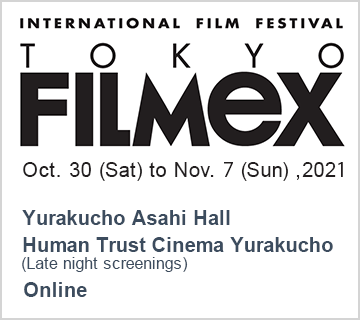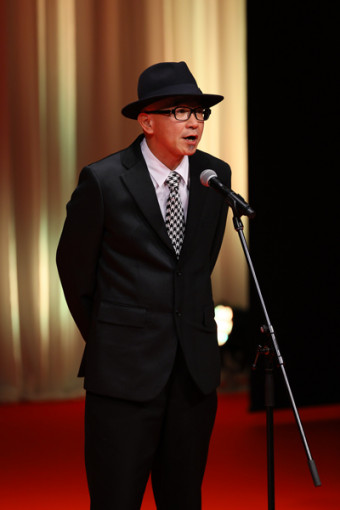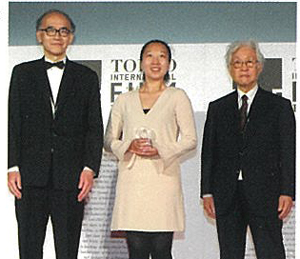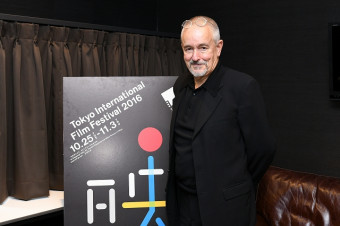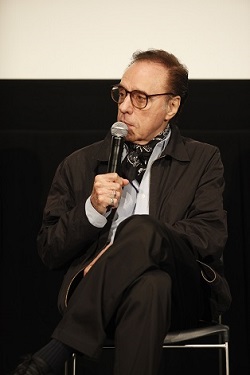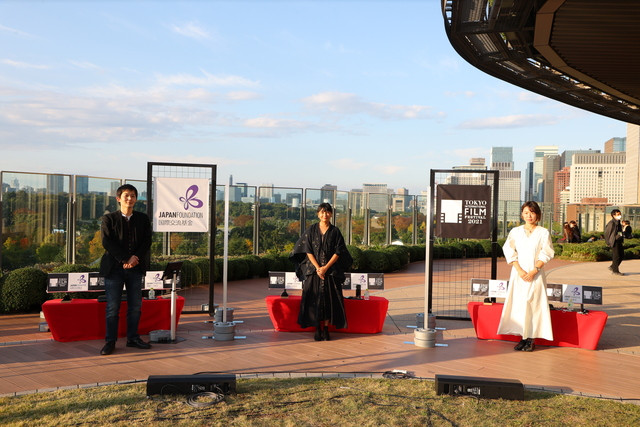
The fourth session of the Conversation Series at Asia Lounge highlighted the issues facing today’s women filmmakers, with Jakarta-based Kamila Andini and Japan’s Sode Yukiko appearing in person at Tokyo Midtown Hibiya, one of the new venues at the 34th Tokyo International Film Festival (TIFF), on November 3.
Co-presented by the Japan Foundation and TIFF, the series is bringing together acclaimed filmmakers from Asia and beyond to engage in friendly dialogue with their Japanese counterparts each afternoon through November 7, with audiences able to livestream each of the talks.
Moderator Tsuchida Tamaki, of Waseda University and the Yamagata International Documentary Film Festival, began by mentioning that Andini’s new film Yuni, which has been selected as Indonesia’s 2022 Oscar submission, would be screening at the TOKYO FILMeX festival later that day. Her last feature, the hauntingly beautiful Balinese spiritualism-inspired tale The Seen and Unseen, had been a co-winner of the Grand Prize at FILMeX in 2017, among some 30 other awards it received internationally. Sode’s 2020 film Aristocrats was screened at TIFF last year, before traveling widely to festivals overseas.
Noting that both women were mothers as well as filmmakers, Tsuchida started the discussion by saying, “You’re both of the same generation and you’re also raising children while working in the film industry. I’d like to hear about the special challenges you face in the latter half of this session. But first, I’d like you each to share your thoughts about the other’s work.”
“I’ve seen all three of Kamila’s features,” said Sode. “The first two are very intellectual and feature unique expressions and locations. Yuni is totally different, which surprised me. Without giving too much away, it’s about a high school girl who has to consider marriage, and how society looks upon that. The traditions and social background is so different from Japan, but it’s something I could relate to. I think Japanese women will be able to really relate to the film’s themes.”
“The way the actors express their emotions is a bit different from what we see in Japan. It felt very realistic, very modern. I think you were trying to show that this young girl was trying to find her own identity, to stand on her own two feet.”
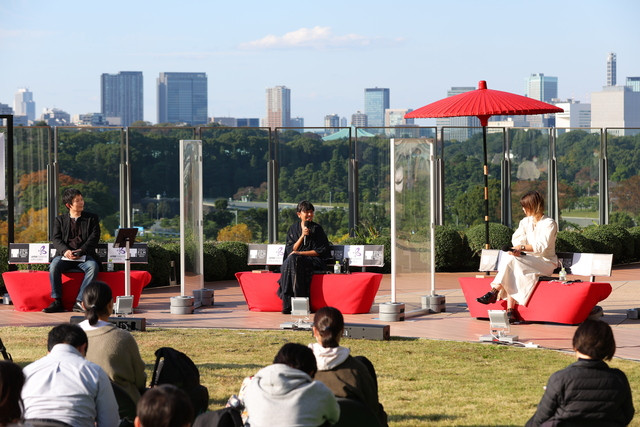
Andini admitted that she’d not yet had a chance to see Sode’s earlier work, but “What’s very special about Aristocrats is that it’s written and delivered with a female gaze, very sensitively built for each character. The characters are truly Asian. We may come from different countries, but I really related to their feelings, what they’re fighting for. It portrays what Asian filmmakers face in society.”
“I also found it very memorable that you depict women form different classes of society, but both you and the film see them equally, which is very inspiring. It also talks about the ownership of being a woman, and this is similar to my film Yuni, in which the character is looking for her role in society.”
Responded Sode, “In Japan we don’t really admit that we have this difference in classes. We all think that we’re equal, that’s the foundation of our thinking. But we start out differently, depending on which family we’re born into. Affluent children become affluent, while the poor can’t escape their poverty. In that kind of environment, what boundaries do women have? How can they cross them? There comes a moment when [the characters in Aristocrats] start to discover what they own, which is the ending of my film.”
“In Yuni, her friends support her whenever something happens. Girls do talk about things like they do in the school bathroom scene. Those girls don’t own what the boys own, but they do own their friendship.”
“Women are different depending on where we live and who raises us; we become what the people around us want us to be,” said Andini. “In Indonesia, women want to be part of society, and we think of others before ourselves. But then we have questions about our decisions—is it for others, for myself, for my family, for society? In Yuni, I talk about ownership of the body. Often the wife is supposed to be a servant for the husband, and somehow our bodies belong to someone else. Who actually owns our bodies, our thoughts, our decisions? I think both Yuni and Aristocrats are about this.”
“There’s a moment in Aristocrats in which your character realizes that everything will be owned by her husband’s family, even her children will be taken away. She feels like she won’t have anything. That’s why she wants to be independent. I think that’s very liberating, to see that.”
Said Sode, “We have many choices, but the point is that there are situations in which [the characters in Aristocrats] don’t feel they have options. But I don’t think it’s really like that, and that’s what I wanted to explain.”
“Yuni talks about [options like] education and support from society,” Andini commented. “Many parents do want their kids to go to school and get a good education, get a good job and get married. But because they themselves don’t have a good education, they don’t know what it takes to properly support their children. Society views marriage as a way to become an adult. People can change their lives if they marry someone good. University takes a lot of money and hard work, and even with a college education, people can’t find a job. With marriage, it’s more clear. It’s a solution, like a survival strategy.”
Sode was asked about the situation for women filmmakers in Japan. “To be a director in Japan with a child, there’s a lot of anxiety about how we can continue to work,” she said. “[With other female directors] we started thinking about what we could do to support each other and especially younger filmmakers who might want to have children.” But she admitted it was difficult to ask for what seemed to be special privileges, like being allowed to spend more time with family.
Andini recalled, “I made my first feature, then I got married and had my first daughter. I was a new mother and I was so in love with my daughter. I thought, she’s my world. There was a time when I thought I might not make films, and even though I had my second feature script written, I didn’t touch it. I was asked to direct a short film, and I wrote a story about the issues I was facing. Then I got pregnant again and after 2 years I was finally back in the director’s chair, making Following Diana (2015). I remember how happy I was. It reminded me how much I loved film, and I realized I didn’t want to give it up.”
“But I had another problem. I was born into a filmmaking family, and when I was a kid, my father was always going somewhere for weeks and months, on location shoots. My mom’s a housewife, so we were always with her and our lives [weren’t disrupted]. But my kids will be different, since both my husband and I are filmmakers. So who will take care of the kids? We talked about it, and decided that I really want to show them what a filmmaker does. I want them to know everything, so we decided to take them everywhere—I breastfeed on location, we take them to the studio and even to the festivals, so they know exactly what we do and how much we love doing it.”
“When they have to go to school, it will be a new challenge. But for me, I can’t separate film and family. I think it’s important to show this to others. My actresses see me bring the kids to location, and they see that it’s possible to do. I want to give my crew and actresses the chance to bring their own children to location. But we are professionals, so I make sure my crews are fine working with a director who’s also a mother. I want them to consent to that first.”
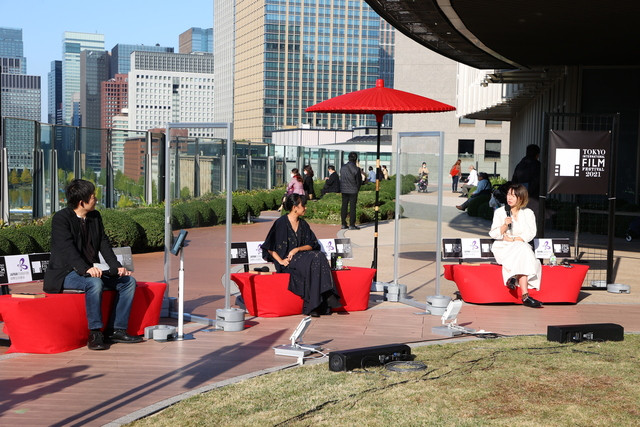
Asked whether she has any assistance in childcare, Andini noted that, “In Indonesia, many women filmmakers have babysitters, because they’re very cheap. It’s common that every household has a helper, and some families have one for each baby.”
“I really envy Indonesians,” said Sode. “I had my older son in Tokyo, and it’s very difficult to get children into nursery school here. Sometimes women have to quit working because of that. So I moved to Kanazawa, quite far from Tokyo, where I could get him into nursery school right away. “
“For Aristocrats, I was away from my 4-year-old son for 4 months. My mother-in-law took care of him, but he had some psychological issues about the separation and was crying all the time. About a year ago I had my second child, and since everyone was always saying, ‘Oh, it must be so difficult to work, because you have a child,’ I decided not to tell anyone about it. I had a big tummy, but we were on Zoom for meetings due to Covid and they couldn’t see it… I don’t want to [inconvenience people on set], so I feel I can only bring the children on special occasions.”
“I think it’s significant that in Indonesia, it’s normal to bring them to the workplace. When I think of the younger generation here, maybe I’m not helping them by keeping my pregnancy secret.”
But Sode also admitted, “Kamila mentioned wanting to be with her child all the time, but I just wanted to have my alone time. When my son finally went to nursery school, I was so relieved. My husband comes home from work quite late, so the only time I could work was after my son was in bed. To be in an environment in which people are understanding about breast feeding is really ideal. I feel like those smokers who have to find a smoking area; I’m always looking for the ladies room so I can pump out milk. Our society isn’t set up for women with children.”
Andini recalled, “In 2013, I was in the Cannes Cinéfondation Residency, and I had a conversation with another filmmaker. She asked me if I ever wanted to have kids, and when I said ‘Yes!’ she was like, ‘Really?’ Maybe she was thinking about the Palme d’Or, and she thought it would be really, really hard for a woman with children to go that far. But these kinds of questions follow us all the time. ‘Can I achieve my goals after I have children? Can I fully develop as a filmmaker?’”
“In interviews,” said Sode, “they know I have children, and they always ask, ‘As a mother, what do you think about—?’ Male filmmakers are never asked such things. I think we should be able to say that we’re proud about having children and being able to work, without feeling inferior. I would also like to be a benchmark for being able to work without having to live in Tokyo.”
“The support system is very important for women to be able to do this,” emphasized Andini. “The whole family has to help us to achieve our dreams. You need people around you who understand that it’s worth it. It’s not easy to surround ourselves with these people. I was worried before I got married about whether my in-laws would understand. It’s important that the person you marry understands your dream, your passion and the sacrifices you have to make for your goals.”
As for what might be done to improve the situation for women filmmakers in Japan, Sode said, “There’s a limit to what we can do on our own, but there are many young female filmmakers now, and I’m sure more of them will choose to have children. As Kamila was saying earlier, it might be difficult to bring my children to the set, but maybe I can start bringing them to the editing suite or perhaps a promotional event. Some actors are now requesting childcare services on the set, so things are changing, but it’s a budgetary issue. If I’m open and say I think we can work and have children on set, maybe that would help.”
Guest Speakers:
Kamila Andini (Filmmaker)
Sode Yukiko (Director / Screenwriter)
Moderator:Tsuchida Tamaki (Program Coordinator
Yamagata International Documentary Film Festival / Assistant Professor, Waseda University)
Conversation Series at Asia Lounge
Co-presented by The Japan Foundation Asia Center & Tokyo International Film Festival






